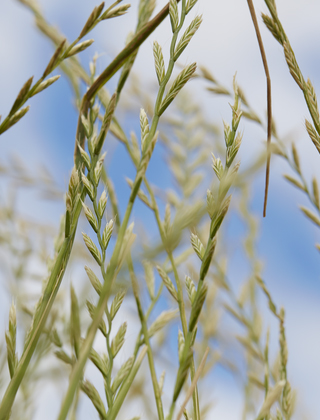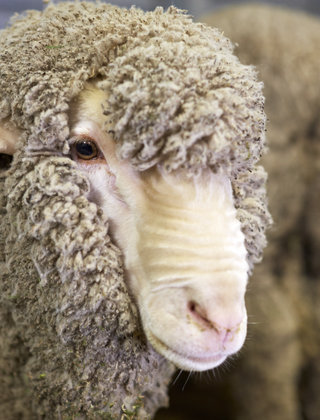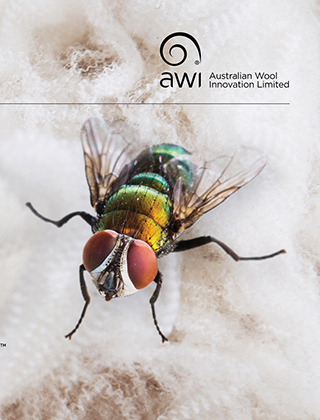Why, when & how to supplement for success
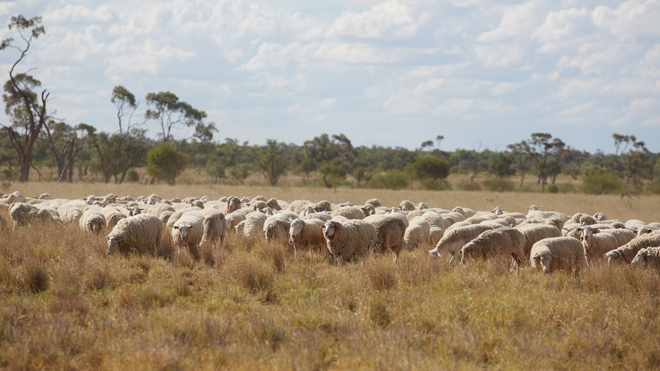
In a recent AWI Extension NSW webinar, livestock nutritionist and producer Nicole Logg from NSW provided woolgrowers with advice on the effective use of supplements to improve sheep productivity.
Nicole Logg is a qualified livestock nutritionist with more than 20 years’ experience. Her passion lies in product innovation and using scientific research to improve feed rations for achieving optimal health and performance of livestock.
As well as running her livestock consulting business, The Livestock Coach, Nicole and her husband run a mixed farming operation near West Wyalong in the northern Riverina of NSW producing wool, prime lambs and cattle. She is also an accredited trainer for the AWI co-owned and supported Lifetime Ewe Management course and AWI’s Winning With Weaners workshops.
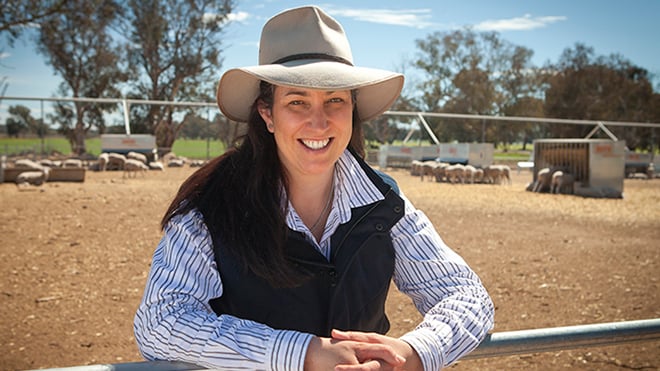
Livestock nutritionist and producer Nicole Logg from West Wyalong, NSW.
Nicole was awarded a 2023 Nuffield Scholarship supported by AWI to research how sheep producers can strategically use supplements to not only provide energy and protein, but also enable their sheep to utilise the nutrients in their feed more effectively, thereby improving productivity.
In February, just prior to heading off to Italy, France and Spain for a month to visit some sheep properties as part of her Nuffield study tour, Nicole presented an hour-long ‘Supplements for Success’ webinar hosted by AWI Extension NSW.
Although the webinar focussed on macro minerals, trace minerals and vitamins, Nicole also advised woolgrowers of the primary importance of ensuring their livestock’s requirements for energy and protein are met.
Why supplement?
“Remember Liebig’s law of the minimum, which states that growth is not dictated by the total resources available, but by the scarcest resource.”
- Nicole Logg
Supplements can be used to firstly, improve the reproductive success of ewe and rams, and secondly optimise the performance of their lambs going forward.
(1) Reproductive health
The aim with reproduction is to improve conception rates, hold onto the pregnancies, get a viable lamb or hopefully twins on the ground, and make sure they survive and thrive.
“Rams could really do with a bit more zinc, selenium and manganese to help with sperm development and viability, ideally about seven weeks before joining,” Nicole said.
“For ewes, calcium is really important throughout pregnancy, lambing and lactation. It helps provide bone health, muscle and nerve transmission. However, magnesium and vitamin D are also important because they help the calcium be absorbed from the intestine.
“Manganese and selenium help the ewe express oestrus through joining time which can lead to better conception rates and also helps with embryo survival.
“Magnesium is really important for the ewe’s muscle contractions along with lots of enzymes in her body.
“Phosphorus and copper can also support fertility in the ewe, although in NSW we don’t tend to see the big phosphorous type deficiencies that they do further north into Queensland for example.
“The other important one is cobalt which is required for the rumen microbes to make vitamin B12 that is involved with energy metabolism for lambing and lactation.
“For lambs, right when they’re born, selenium and iodine are important because they support the thyroid hormones and brown fat metabolism which is a little turbo heater that keeps the lambs warm for a little while so they can get up and go and get a drink.”
Lambing is an obvious stress on the ewe. However, other physical stresses on the body, such as mustering and yarding, and environmental stresses, such as heat stress, can impact reproductive health throughout the year.
“All those little stresses can add up, so look at some antioxidants, selenium and vitamin E, to help at these times,” Nicole said.
While sheep have a requirement for potassium, it is particularly high in green pasture and far in excess of what ewes actually need. Whilst you can’t reduce the potassium available from the pasture, you can balance it out by ensuring they have enough sodium available through supplying salt, especially at lambing time.
(2) Growing & finishing stock
Supplements can also be used to optimise the performance of ewe and wether lambs that producers want to grow and finish.
“For replacement ewes, we obviously want you to try and enhance their fertility moving forward, and in wetter years focus on hoof health because we need to make sure they can get around and eat,” Nicole said.
Nicole said there are some minerals that are particularly important for optimum wool quality.
“One is sulphur, which helps the crimp in wool, and incidentally also helps with hoof health. Copper is also important for crimp, but you need to be careful because copper can be toxic to sheep" she said.
“Zinc is really good for wool follicle development and skin health, and selenium has also been shown to help with the growth of wool.”
For meat production, Nicole said there needs to be a balance of calcium and phosphorus, as well as zinc, selenium and copper for a good frame and muscle development.
“A good appetite is also important to keep them eating and growing, which is stimulated by a healthy rumen environment but certainly B12 (derived from cobalt) will help do that, and zinc and sodium (salt) are important too,” she added.
When to supplement
When supplementing, it’s important to take into account the season and what the plants in the pasture are doing.
“As plants grow, they move from their vegetative state – small plants with small leaves– into their reproductive phase. As they get bigger their root system develops and that really helps them increase their nutrient absorption out of the soil,” Nicole said.
“Improved soil health and biodiversity of plant species will reduce mineral deficiencies. A long-term approach is to work with your agronomist to get your soils up to scratch and try and get lots of different plant species in there to help reduce mineral and vitamin deficiencies.”
“The better we can support growth for a range of plants, the more nutrients and minerals the sheep will be able to utilise.”
- Nicole Logg
“We have to look at what green feed is available or whether there is just dry feed. Green feed will supply vitamins A and E. A nice healthy rumen will provide a whole range of B vitamins and vitamins K and C, so that’s why you never see extra requirements for those vitamins.
“As feed dries off, they lose their vitamin A and E content. Sheep can store vitamins A and E for 3–4 months so deficiencies only kick in through the end of summer or during a drought.
“During cloudy winters, there can be a lack of sun to activate the vitamin D in the skin. In wetter winters, we always see more deficiencies due to more leeching out of the soil. Also if you’ve got a good supply of feed coming on, the sheep are actually ingesting less soil that can be a source of minerals for them.
“Due to Australia’s old soils, selenium tends to be deficient year-round for areas with more than 450mm rain and on granite/coastal/sandy and legume-based pastures.”
Table 1: Sample seasonal plan based on plant growth
|
SUMMER – dry feed - More soil ingested. Cobalt and copper tend to be OK - Low vitamins A and E - Lack protein ► Protein based supplement for lamb growth and ram preparation for joining |
AUTUMN – short green feed - High moisture, rapid movement through gut - Plant roots young and developing, low uptake of minerals - Sheep rely on liver storage, cobalt depletes quickly ► Start supplementing minerals for pre-joining or lambing/lactation and lamb growth |
|
WINTER – green feed, slow growth - Potentially lack vitamin D - Less nutrient absorption due to slowed growth ► Supplement grazing crops or grass-based pasture due to high potassium, low magnesium issues. ► Use calcium, magnesium, sodium (and iodine) based products - Late winter, roots develop for improved uptake |
SPRING - Warmer soils, improved root growth - Legume growth - Low B12 (cobalt) due to less soil ingested ► Supplement lambing/lactating ewes, they will pass any deficiencies onto lambs |
Note: Plans are dependent on location (e.g. high/low rainfall and season length), soil type and plant type (e.g. legumes vs grasses vs forbs/herbs).
To identify deficiencies, there are several options for testing.
“Obviously soil testing is a big one; so what have our plants actually got to utilise, what might be locked up and what can we access? If you use bore water, then water testing can also be useful because bores can be a source of minerals. Other less common options include plant tissue testing, blood testing and a liver biopsy,” Nicole said.
“Obtain professional advice such as from an agronomist, for your soil and pasture, or an LLS or supplier vet that you can work with through your local rural retailer.”
How to supplement
Long term options (that last more than 12 months):
Options include fertiliser application to improve your pasture growth or grazing crops; foliar application in which the leaves are directly sprayed; adding supplements to water troughs; rumen bolus, which is like a large pill that sits in the rumen and slowly releases selenium and/or cobalt for three years; and selenium injections which will last up to 18 months.
Medium term options:
There are multi-mineral injectables that last for 3-4 months that are suitable for a season or coming up to lambing or pre-joining or weaning time. There are also injectables that last 6-8 weeks, such as a B12 injection for spring at lamb marking or pre-lambing; or vitamins A and E injections in late summer or drought. Although injectables require a bit of labour, at least you know that all the animals receive the right dose.
Short term options:
There are a lot of commercially formulated mineral licks and blocks available. Nicole advises that if you are feeding blocks and licks, check how many sheep you are giving them to and how long they are taking to eat it, and work back to see if they are consuming the required amount. Another of Nicole’s tips is to first put out some loose salt, so the sheep can get their sodium craving out of the way and only then give them the commercially formulated licks or blocks. This ensures the sheep don’t get three or four times the dose of the minerals when initially trying to satisfy their sodium needs.
Other short-term options include home mixing minerals or blocks such as limestone (for calcium), magnesium, and dolomite (for calcium and magnesium); free choice minerals in which the sheep self-select from a range of say 20 minerals (although Nicole cautions there has not been much research on this); and some vaccines and drenches contain selenium and vitamin B12 which last for about two weeks.
More information: The webinar recording is available on: www.awiextensionnsw.com/webinars
This article appeared in the June 2024 edition of AWI’s Beyond the Bale magazine. Reproduction of the article is encouraged.






